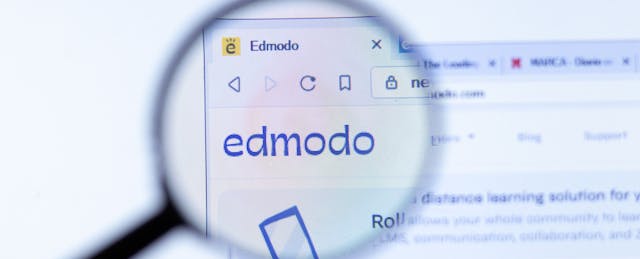A popular communication and collaboration tool for K-12 teachers that’s been around for more than a decade is closing for good.
Edmodo is permanently shuttering, the company announced late Monday.
It’s no longer viable “for us to maintain the level of service you deserve and that we can take pride in ourselves,” the company wrote in an online explanation of its closure.
Those with data on Edmodo should remove it by the end of the day September 22nd if they don’t want to lose it, officials stated. That’s just a few weeks away.
Started in 2008, Edmodo boasted tens of millions of users. It was originally considered a competitor to Schoology and Google Classroom, and it was popular with teachers.
Its folding led to some eulogizing on social media platforms like Twitter.
“It's so sad!” wrote one educator on Twitter. “Edmodo platform was one of my best app when I started teaching in 2013.”
In 2018, the company was acquired by the China-based NetDragon Websoft, which led to speculation that the deal could mark the decline of standalone education companies offering free services.
The company also had a global presence, and was recommended by UNESCO for distance learning during the early phases of the pandemic.
Edmodo did not respond to an inquiry from EdSurge.
What Happens To The Data?
So what happens to all that sensitive data—Edmodo claims to have had more than 100 million users—once the tech company ceases to exist?
Some observers see this as a big issue that will be tested with the demise of Edmodo.
It has become the norm for schools to outsource much of their infrastructure to third parties like Edmodo. This means that the companies end up with large amounts of sensitive data. Meanwhile, the data collected by edtech companies are normally considered assets that can be transferred, including in Edmodo’s case, which can make it possible for companies to sell off their data when they go out of business, according to Bill Fitzgerald, an independent privacy researcher.
Without larger industry commitments to make the deletion of that data upon quitting operations the norm, he says, it comes down to the conscience of the company in question.
In this case, Fitzgerald believes that things turned out well: In its closure notice, Edmodo said that it would destroy the data it holds.
“I think Edmodo does deserve credit for doing the right thing,” Fitzgerald says.
In other cases, things haven’t gone as privacy advocates hoped.
In 2014, for example, ConnectEDU’s bankruptcy triggered federal attempts to block the sale of student data. More recently, there’s been mounting pressure on edtech companies to handle sensitive data well, including federal commitments to be tougher on enforcement.
“The fact that [Edmodo] chose not to [sell it off] is great, but it shouldn't be down to the largess of a company that's no longer gonna operate,” Fitzgerald says.


